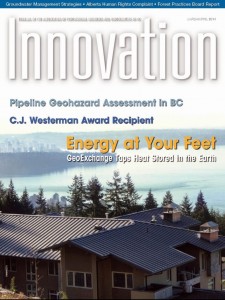I’m an Environmental Geoscientist. That means I went to school and studied geosciences (in my case, a degree in Physical Geography and one in Earth Sciences), and practice in the area of environmental geology. To call myself a “Geoscientist” in B.C., I need to belong to a professional association, the same one as those who want to go around calling themselves “Engineers”. That organization is APEG-BC. For the most part, I am happy to belong and receive both the scrutiny and the protection of a professional body regulated by a Provincial Law.
However, Engineers and Geoscientists are a diverse group of people. People designing your smart phone (or apps for it), people designing airplane wings and others making sure they don’t fall off, people building roads and others inspecting dams, people exploring for new oil and gas reserves in the province and people working to make a pulp mill work more efficiently or a power grid more robust. A few of them are scientists in the traditional sense of exploring and testing new ideas to expand the world’s body of knowledge, but most are applied scientists doing their best to apply the existing body of knowledge to solve immediate problems. The difference can be subtle to the lay public, but think about the difference between a medical researcher dedicating their life to finding a cure for disease, and a doctor who spends her career helping people feel better.
Nowhere is the difference between research science and applied science as practiced by most engineers and geoscientists better demonstrated than on the topic of Anthropogenic Climate Change. Simply put: the vast majority of scientists working in the relevant fields of climatology, atmospheric sciences, ecology, ocean sciences, Quaternary geoscience, etc. are convinced by the body of evidence that the climate is changing at a rate unprecedented in human history, and that the change is caused by people putting greenhouse gasses into the atmosphere at a faster rate than natural systems can remove them. It appears, from both the academic and popular press, that those that apply science for a living are less convinced.
I have no statistical evidence to support this claim, only my totally anecdotal impressions from following the “controversy” in the media (as any good scientist can tell you, the plural of “anecdote” is not “evidence”). I suspect that the majority of engineers and geoscientists are convinced of the reality of anthropogenic climate change, but whenever a group of climate change “skeptics” pops up, the crowd seems to comprise an unrepresentative number of engineers and geoscientists.
The problem became more apparent recently when my professional organization approached the subject of Climate Change. After what I have been told was a lengthy internal discussion, APEG-BC released a policy paper on Climate Change this spring (which you can read by following that link).
I have a problem with the result.
The Position Paper is 1,000 words long, but is more notable in the many words that do not appear: carbon; greenhouse; gas; warming; anthropogenic. It is the softest, most equivocal position paper on the topic I have ever read. It is actually hard to figure out what the “Position” is.
Lucky, our organization has multiple internal communications systems, and the letters to our professional magazine “Innovation” is one of them.
So here is my letter to the Innovation, published in the March-April 2014 edition:
As a professional geoscientist, I was pleased to see APEGBC issue a policy paper on climate change. However, I was disappointed reading the actual document. In stating that “APEGBC recognizes that the climate in British Columbia is changing”, the document appears so equivocal as to be meaningless.
That our local climate is “changing” is not up for debate. The more important issue is that the current global rate of atmospheric and ocean warming caused by anthropogenic activity is unprecedented in human history, and in the history of engineering and geoscience practice. As a profession, we must acknowledge that the unpredictable (and potentially catastrophic) results of this warming are a problem that challenges our ability to protect human health, built infrastructure and the planetary ecosystems that support us. Re-evaluating our assumptions about local weather effects in light of changing climate is useful, but not nearly as important as recognizing that some activities performed by engineering and geoscience professionals may exacerbate the problem.
As our Code of Ethics requires that we “Hold paramount the safety, health and welfare of the public, [and] protection of the environment,” we must go beyond merely evaluating impacts, and we must make the move towards reducing then eliminating the root cause of anthropogenic global warming, through technological innovation and best practices, as part of our regular everyday professional practice.
APEGBC is a public body charged with protecting the public interest. It is our responsibility to recognize risks that may result from our practice, and be clear about the management of those risks. Forthright disclosure based on the best scientific knowledge is the basis of the trust placed upon us by our clients, the general public and our governing legislation. To be equivocal about the cause and potential impacts of anthropogenic global warming is to belie this trust.
I was heartened when the letter published next to two other letters from Professional Engineers in BC saying pretty much the same thing. The letter that followed mine only surprised me in the tepidness of the retort.I think APEG-BC will get it right, this was just a false start.
